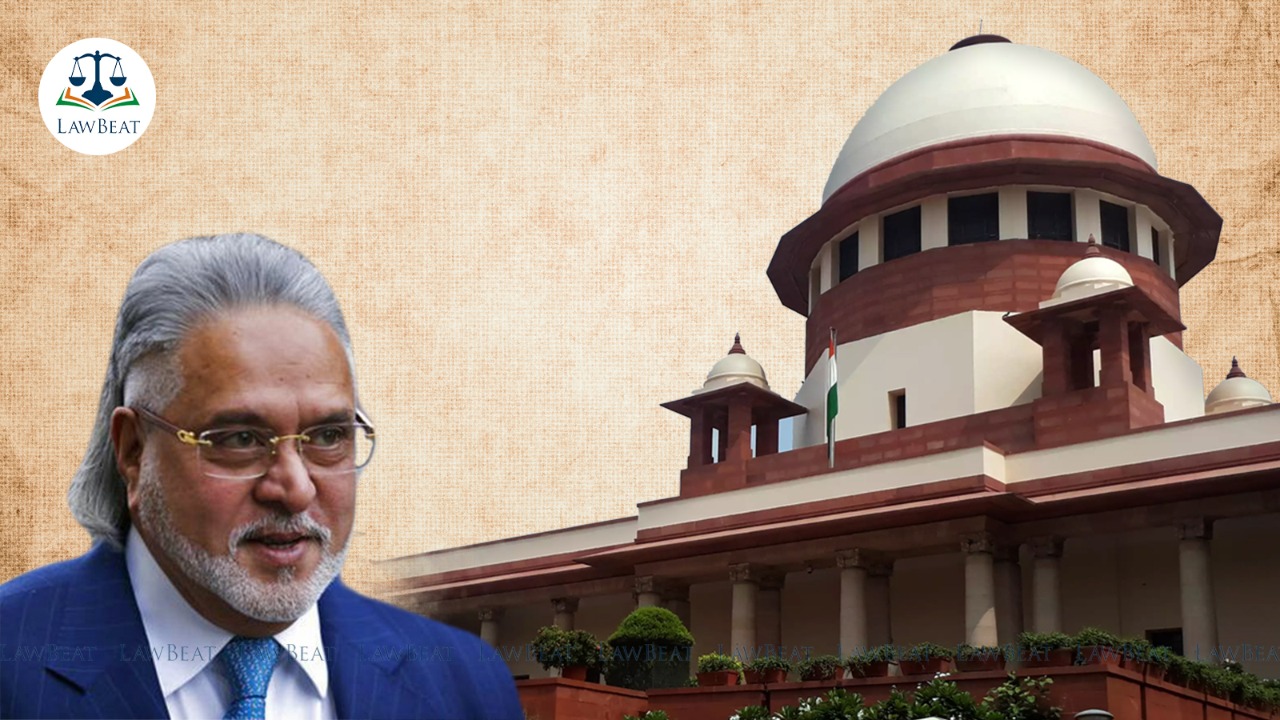Supreme Court sentences fugitive Vijay Mallya to four months in prison for contempt of court

Mallya was found guilty of contempt of court for transferring USD 40 million to his children in violation of the court's order.
A Supreme Court bench of Justices Lalit, Ravindra Bhat and Sudhandhu Dhulia today sentenced fugitive liquor baron Vijay Mallya to four (4) months in prison in contempt of court case. Mallya was found guilty of contempt of court for transferring USD 40 million to his children in violation of the court's order.
The top court, has held that in order to maintain the majesty of law, it must impose adequate punishment upon the Mallya. The court, has observed that it must also pass necessary directions so that the advantages secured by Mallya or anyone claiming under him are set at naught.
The court, thus sentenced Mallya to four months in prison and imposed a fine of Rs.2000. The court, has held that the fine be deposited in the Registry of the Supreme Court within four weeks. On receiving the deposit, the amount shall be made over to the Supreme Court Legal Services Committee. In case the amount of fine is not deposited within the time stipulated, Mallya, will have to undergo further sentence of two months.
Ministry of Home Affairs, has been directed by the court to secure Mallya to undergo the imprisonment imposed upon him. The court, has further more directed, Mallya and the beneficiaries of the transaction in question to deposit the amount received by along with interest at the rate of 8 per cent per annum to recovery officer within four weeks.
The court, has held that in case the amounts are not deposited, the Recovery Officer will be entitled to take appropriate proceedings for recovery. The court, has directed the Government of India and all the concerned agencies to render assistance and complete cooperation.
When, finally came up for hearing in March 2022 and the court intended to hear the amicus on sentencing and to find a way out for the recovery of the amounts which Mallya owes to creditors.
When the hearing for the matter commenced, Gupta submitted that Mallya was held guilty on two counts - one for not disclosing the assets and second for violating the express restraint order passed by the court.
Justice Lalit at this point said, “The proceedings in the UK are like a dead wall, we know there is something pending but we don’t know what it is.”
Gupta, while informing the court that the nature of the contempt is civil, submitted that a fine will not meet the ends of the justice and imprisonment will be needed in this case.
Justice Bhat questioned, “In civil prison, usually aggrieved person bears the burden. Where is the question of burden here?” The court further opined that when they exercise the power to punish, they will exercise the provisions of the contempt of courts act as well as the constitution.
Gupta further submitted that apart from punishment, sequestration is an appropriate method of punishment. Court, at this point, questioned as to what could be done to those accounts from which monies were transferred to his family and questioned if it can retrieve it. Gupta opined that the court could.
Gupta further opined that the transactions made by Mallya to his family could be reversed and if the money does not come back, his assets could be attached.
Justice Bhat opined that if it is left to the parties (creditors) to recover the outstanding amounts, they can use the order of the Supreme Court like ‘swords in their hands' to enable recovery.
The amicus submitted that in case the money had been transferred further from those accounts the court should pass an order to the effect of trancing the money. A counsel appearing for the banks submitted that the union could pass an adequate sentence so that an example could be set and ends of justice could be met.
Ankur Saigal, the advocate appearing for Mallya, informed the court that he had received a communication from Mallya on 17th January, however, he has no instructions from him in relation to this case.
Court, on hearing the parties, noted that Mallya was given specific liberty to advance his submissions in relation to the order of contempt, he was also given liberty to be represented by the counsel. Court noted that Saigal appearing for Mallya was invited to make submissions on merits but he has expressed his inability to do so. Court however directed Saigal to file written submissions if any and reserved the matter for orders.
Mallya had been held for contempt of court in 2017 for not disclosing the particulars of assets as directed by the court in a plea filed by the State Bank of India. In addition to this, the apex court had noted that the allegations for contempt are on two counts;
"a) He is guilty of disobeying the Orders passed by this Court in not disclosing full particulars of the assets as was directed by this Court.
b) He is guilty of violating the express Orders of Restraint passed by the High Court of Karnataka in the same Cause from which the present proceedings have arisen."
In connection to this, the Court had observed that Mallya is guilty of having committed contempt of court on both counts. Court had further observed that "though we have found him guilty of having committed contempt of court, we deem it necessary to give him one more opportunity and also hear him on the proposed punishment."
Case title: State Bank of India Vs Dr.Vijay Malayya
